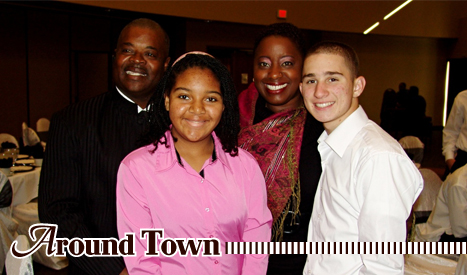
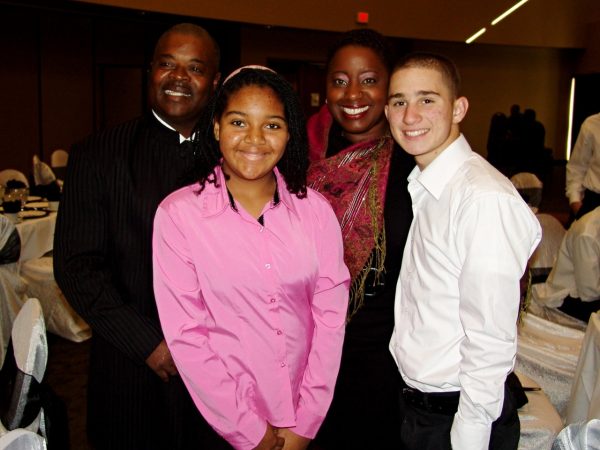
By Kristyl Smith
It is a well-known fact that two out of every three African American children grow up without a father.
Every possible explanation has been developed as to why it continues to plague the community like a decades-long bad cold. But anything that lasts this long is not arbitrary – it’s chronic.
As a response, Daphyne Watson, the executive director of Mental Health America of San Diego County (MHASDC), founded Father to Child in 2012. It is a non-profit that was established with the intention to provide a community-based solution for the epidemic of absentee fathers.
A year later, the program has a relatively high success rate in drastically improving relationships between fathers and children by addressing the needs of the father directly.
“What inspired me was that many kids and families we saw really needed the help; the kids needed a father,” said Watson. “Mothers were doing the best job they could, but the fathers were out of the picture.
“African-American men were traditionally always with their families. Once we [created] that opportunity for them, they have flourished and made it their own”.
This 12-week program is partially facilitated by mental health professionals from MHASDC. However, it is the men who have created the environment needed to develop their skills as fathers and men.
“All of the men that come through the program really show and demonstrate a profound difference from when they started,” Watson said.
This semester, 18 men began their journey to better fatherhood. Their graduation ceremony took place Wednesday, December 11th at the Jacobs Center in southeast San Diego.
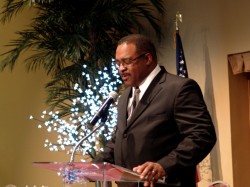
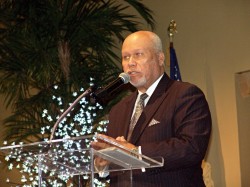
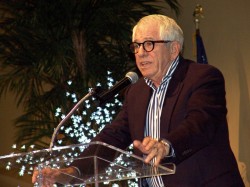
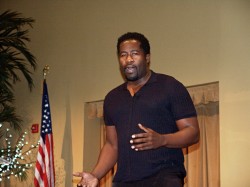
Awards were presented by Arron Wooten, a San Diego native and co-facilitator of the program. A special bond has been built between Wooten and every man he presented to, and it was apparent throughout the ceremony.
“I am the guide that allows people to discover what’s already there within them,” Wooten said.
The audience consisted of family, friends and supporters of the graduates, community leaders, African-American professionals of various fields, and other community organizations.
Mulemvo Niando, an alumni of the program, began the entertainment through a spoken word performance, and Darren Sherrill, a recent graduate, performed an original song and the motto of the program.
James Cannon Sr. and James Cannon Jr., grandfather and father of San Diego native Nick Cannon, also presented.
Cannon Sr. provided words of wisdom for parents and Cannon Jr. performed a monologue, which told the stirring tale of a son’s resistance to his father love.
“This program speaks to the heart of men and we need more programs like that,” said Cannon Jr. “I think the Father to Son program needs to be in every city in the country.
“There’s a lot of programs for women and young girls to help them with the questions they need answers to, but very few for young men.”
The keynote speaker was Daniel Beaty, playwright, poet, and creative artist, most recently known for his portrayal of Paul Robeson in “The Tallest Tree”.
He is also well known for his powerful spoken word performance of “Knock, Knock”, which describes his experience growing up with an incarcerated parent. He performed this among several other poignant pieces reflective of his experiences and triumphs.
“I believe their mission here is incredible and if there’s anything I can do to support the important work they are doing I definitely will,” said Beaty.
The graduates were a diverse group, including Latino and Caucasian participants, active fathers, inactive, some with criminal backgrounds, active community members, and one non-father still in high school.
“Some of the judges have actually been requiring some of the men to come to the program,” said Watson, “and once they come one time, they come not because they have to it’s because they want to.
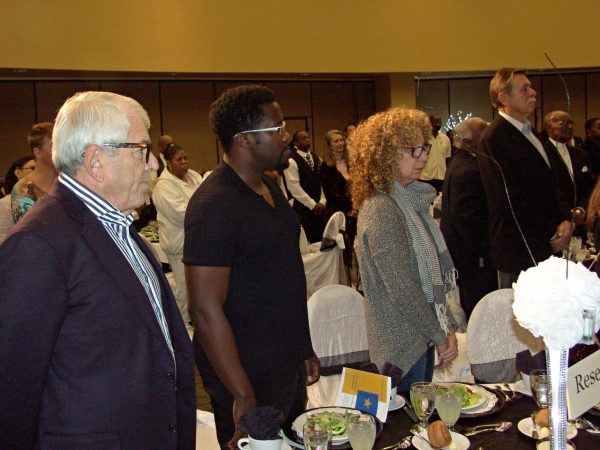
“It shows that it really does penetrate and help them in ways that haven’t been done before. We are willing to accept and support any man that wants to do this.”
Fathers are also able to interact with their children during the program. Some fathers bring their children to recreational activities so they can learn how to enjoy spending time with them.
Watson also stated that they intend to expand the program throughout San Diego and to other communities. Furthermore, they want to extend their reach to the children as well by creating a boys and girls group.
Father to Child is not only garnering support from the African-American community. Administrators from San Diego State University and board members from the La Jolla Playhouse also attended the graduation.
Jeffery Ressler, chairman of the La Jolla Playhouse, was exposed to the program for the first time. Ressler stated he was “touched in his soul” after the closing of the ceremony.
“I spent 40 years in the criminal law business as a prosecutor as well as a defense attorney,” said Ressler. “I know the problem, I am fully aware of it and I believe what [the program] is doing is essential to the future of the black community.
“[This] program among others is trying to teach [African-American men] so that the community can become stable. We are absolutely going to continue supporting the program.”
The potential of the Father to Child program is a rare opportunity for an all-encompassing family-oriented program to build the foundation of father and child relationships.
“It’s [about] honoring them, letting them have a voice, letting them know they are valued, and that it’s important they are there,” said Watson. “They love their children just as much as any other parent.”


